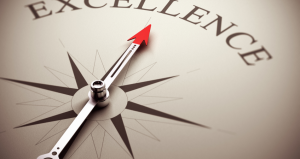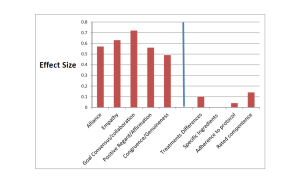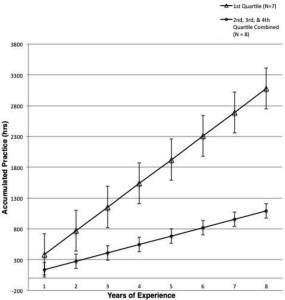It’s one of those secrets everyone knows, but few talk openly about: some therapists are more effective than others. Available evidence indicates that clients seen by these practitioners experience 50% more improvement, 50% less drop out, have shorter lengths of stay, and are significantly less likely to deteriorate while in care.
So, how do these top performers achieve the superior results they do? More to the point, is there anything the rest of us can learn from them? The answer is a resounding, “YES!” Over the last decade, researchers have started to unlock the secret to their success.
If you want to improve your effective effectives:
- Give yourself, “The Benefit of Doubt”
Turns out, top performing therapists evince more of what researchers term, “professional self-doubt.” They are, said another way, less certain about how they work and the results they achieve than their less effective peers. To be sure, their doubt is not disabling but rather a first step, the harbinger of new learning. As UCLA basketball coach John Wooden once quipped, “It’s what you learn after you know it all that counts.”
One sure fire way to give yourself the benefit of doubt is to measure your results. Research shows, for example, that most of us overestimate how effective we really are—on average, by 65%! Augmenting your clinical judgement with reliable and valid feedback about when you are and are not successful will challenge you to reconsider what you long ago stopped questioning.
Assessing the outcome of your work is no longer difficult nor time-consuming. For example, the Outcome Rating Scale (ORS) takes less than a minute to administer and score and can be downloaded and used for free. More, a number of web based systems exist that not only alert you to clients “at risk” for dropping out, or experiencing a negative or null outcome from treatment, but also compute and compare your effectiveness to national norms. I reviewed two such systems in recent blog posts (1, 2).
- Connect for Success
Research shows that 97% of the difference in outcome between therapists can be accounted for by therapist variability in the therapeutic relationship. Said another way, the single largest difference between the best and the rest is the former’s ability to connect with a broader, more complex, and diverse group of clients.
Can you think of any aspect of clinical practice that has yielded such unequivocal results? The bottom line for those wishing to become more effective is, work on your relationship skills.
As far as which element of the relationship you might want to focus on, consider the graph below. In it, you will find the effect size associated with each. To the right of the blue bar are aspects of psychotherapy that receive the majority of professional attention in graduate school and continuing education events, and their relative contribution to outcome.
By the way, for the first time this summer, the ICCE is offering a single day intensive ethics training. If you need ethics CE’s, this is the event you want to attend. The focus? The relationship. Given the findings noted above, isn’t that the right thing to be talking about?!
Mark your calendar: August 12th, 2015. Chicago, Illinois.
Register early as the number of participants has been capped at 35 in order to insure an intimate, individualized experience.
- Slow and Steady Wins the Race
In the proverbial race between Tortoises and Hares, the most effective clinicians fall squarely in the camp of the ectotherms. For them, there are no shortcuts. No fast track to success. No models that, when applied with fidelity, will lead them to treatment nirvana.
Top performing clinicians approach the subject of improving their outcomes the same way investors prepare for retirement: a little bit every day over a long period of time. Compared to average therapists these top performers spend 2.5 to 4.5 more hours per week outside of work in activities specifically designed to improve the effectiveness of their work—an activity known as, “Deliberate Practice.”
You can see how the investment in professional development compounds over time the graph below taken from a study soon to appear in the journal, Psychotherapy.
Of course, the quality of the return depends on the nature of the investment. So, what should you invest in? To get better, you must first identify the edge of your “realm of reliable performance”—that spot where what you normally do well begins to break down. From there, you have to develop a concrete plan, complete with small, measureable process and outcome objectives. This is often best accomplished with the help of a mentor or coach, someone who possesses the skill you need and is capable of teaching it to others. Trial, error, and review follows.
You can learn to apply the latest findings about deliberate practice to your own professional development at a special, two-day intensive this summer. Cutting edge research will be translated into highly individualized, step-by-step instructions for improving your clinical performance and effectiveness. We promise you will leave with an evidence-based plan tailored to your personal, professional development needs.
Mark your calendar: August 10-11th, 2015.
Given the highly individualized nature of this event, registration is limited to 20 participants. You can reserve your spot today by clicking here.
Looking forward to meeting you this Summer in Chicago!
Scott
Scott D. Miller, Ph.D.
Director, International Center for Clinical Excellence






